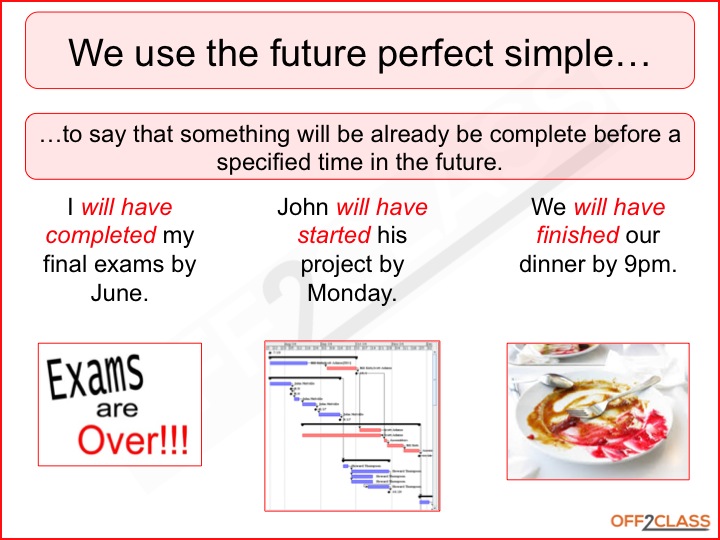

Future perfect
Formación
El "future perfect" está compuesto por dos elementos:
el "simple future" del verbo "to have" (will have) + el "past participle" del verbo principal
| Sujeto | + will have | + "past participle" del verbo principal |
|---|---|---|
| He | will have | finished. |
| I | will have | finished. |
To arrive, "future perfect"
| Afirmativa | Negativa | Interrogativa | Negativa interrogativa |
|---|---|---|---|
| I will have arrived | I won't have arrived | Will I have arrived? | Won't I have arrived? |
| You will have arrived | You won't have arrived | Will you have arrived? | Won't you have arrived? |
| He will have arrived | He won't have arrived | Will he have arrived? | Won't he have arrived? |
| We will have arrived | We won't have arrived | Will we have arrived? | Won't we have arrived? |
| They will have arrived | They won't have arrived | Will they have arrived? | Won't they have arrived? |
Forming the Past Participle (Regular Verbs)
If it's a regular verb, the past participle is the same as the simple past tense. In other words, it is formed like this:Add "ed" to most verbs:
- jump > jumped
- paint > painted
- chat > chatted
- stop > stopped
- sew > sewed
- play > played
- fix > fixed
- incur > incurred
- prefer > preferred
- open > opened
- enter > entered
- swallow > swallowed
- thrive > thrived
- guzzle > guzzled
- cry > cried
- fry > fried
Forming the Past Participle (Irregular Verbs)
If it's an irregular verb, the "past participle" is formed in all sorts of different ways. Here are some examples:- arise > arisen
- catch > caught
- choose > chosen
- know > known
Funciones
El "future perfect" se refiere a una acción que se completará en el futuro. Cuando empleamos este tiempo verbal, estamos proyectándonos hacia el futuro y echando la vista atrás, hacia una acción concluida en algún momento posterior al presente. La mayoría de las veces, se emplea con expresiones temporales.
Ejemplos
- I will have been here for six months on June 23rd.
- By the time you read this I will have left.
- You will have finished your report by this time next week.
- Won't they have arrived by 5:00?
- Will you have eaten when I pick you up?
Future perfect, una ficha interactiva de Alexa_fuentes
liveworksheets.com
liveworksheets.com




